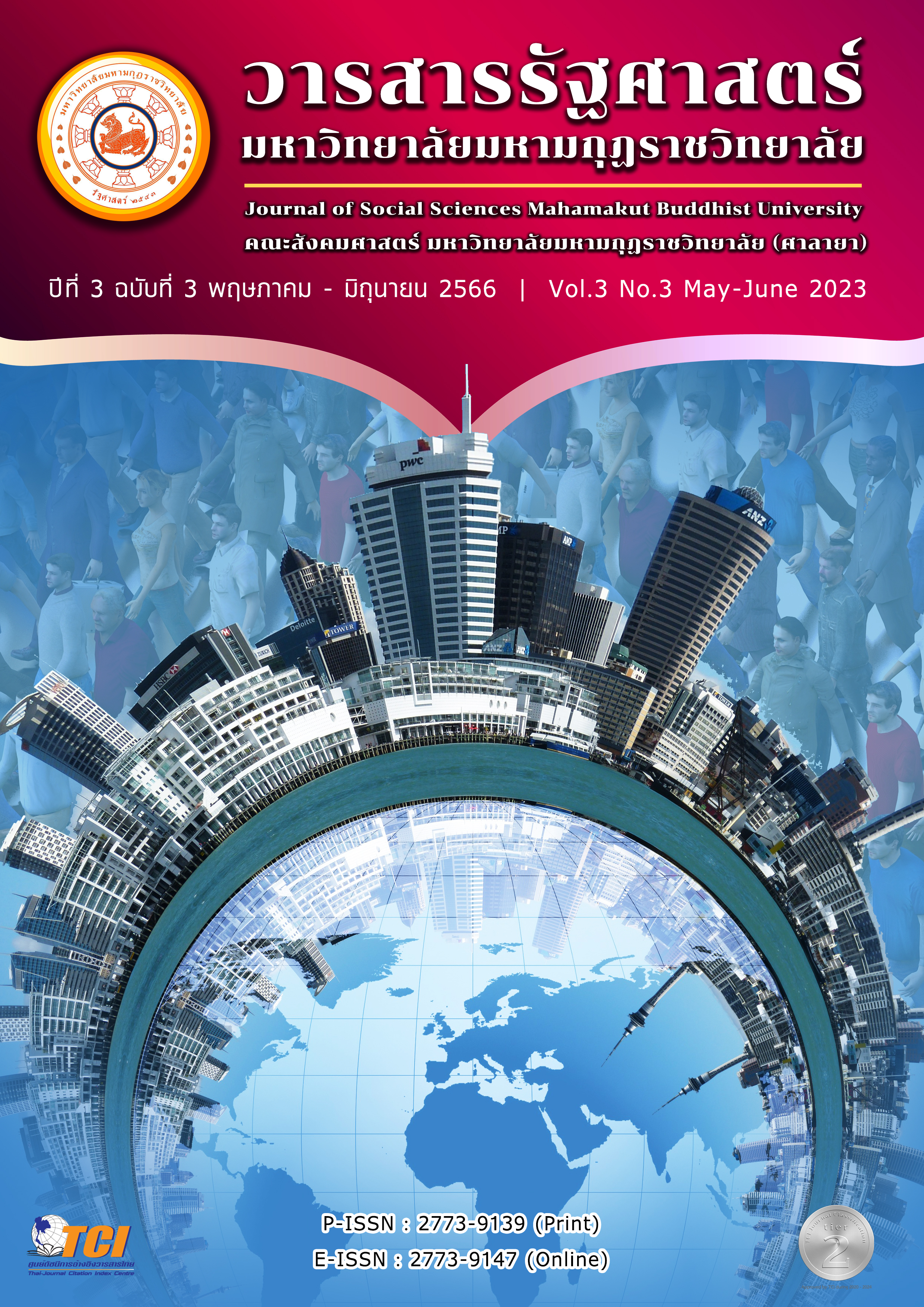THE ROLE OF MUEANG MAI SUBDISTRICT ADMINISTRATIVE ORGANIZATION IN AMPHAWA DISTRICT, SAMUT SONGKHRAM TOWARDS THE BUILDING OF KNOWLEDGE AND UNDERSTANDING IN DIGITAL SKILL TO BECOME DIGITAL CITIZEN
Main Article Content
Abstract
The main purpose of this research was to study the role of Mueang Mai Subdistrict Administrative Organization, Amphawa District, Samut Songkhram Province in creating knowledge and understanding of digital skills to become digital citizens. This research is a form of research and development. Data were collected from in-depth interviews, using interview forms as tools used for research from key informants, namely executives of local administrative organizations and civil servants and relevant employees. A total of 5 people to deconstruct the model of building knowledge and understanding of digital skills to become digital citizens and collecting data to bring information from in-depth interviews to be analyzed as a model for building knowledge and understanding of skills. digital to become a digital citizen. The study found that Muang Mai Sub-District Administrative Organization, Amphawa District, Samut Songkhram Province will play a role in creating knowledge and understanding of digital skills for people in the area in informal ways and digital skills learning styles through 2 main projects: Fun dharma and a community forum where the community will come to exchange with the Muang Mai Subdistrict Administrative Organization, as well as inviting speakers to educate. Social issues will be inserted, allowing people in the area to learn digital skills in an indirect way. and more informal.
Article Details

This work is licensed under a Creative Commons Attribution-NonCommercial-NoDerivatives 4.0 International License.
References
กระทรวงดิจิทัลเพื่อเศรษฐกิจและสังคม .(2560). แผนยุทธศาสตร์กระทรวงดิจิทัลเพื่อเศรษฐกิจและสังคม พ.ศ.2562-2565.กรุงเทพมหานคร: กระทรวงดิจิทัลเพื่อเศรษฐกิจและสังคม.
กรมส่งเสริมการปกครองส่วนท้องถิ่น กระทรวงมหาดไทย. (ม.ป.ป.). แผนปฏิบัติการดิจิทัล กรมส่งเสริมการปกครองท้องถิ่น 4 ปี พ.ศ. 2561-2564. เรียกใช้เมื่อ 8 กันยายน 2563 จากhttp://www.dla.go.th/servlet/EbookServlet?_mode=read&ebookColum=5968#/page/1
ธนาชัย ธีรพัฒนวงศ์. (2561). ปัญหายุทธศาสตร์เทคโนโลยีดิจิทัลเพื่อการบริหารภาครัฐ.วารสารวไลยอลงกรณ์ปริทัศน์ (มนุษยศาสตร์และสังคมศาสตร์), 8(1).
นครินทร์ เมฆไตรรัตน์ และคณะ. (2552). ความก้าวหน้ากระบวนการกระจายอำนาจในประเทศไทยและข้อเสนอ. กรุงเทพมหานคร: สถาบันวิจัยและให้คำปรึกษาแห่งมหาวิทยาลัยธรรมศาสตร์.
ปารวีร์ กุลรัตนาวิโรจน์. (2548). การพัฒนากระบวนการมีส่วนร่วมของชุมชนในการส่งเสริมการออกกำลังกายของประชาชน หมู่บ้านชนบทแห่งหนึ่ง จังหวัดชัยนาท. ใน วิทยานิพนธ์ปริญญามหาบัณฑิต สาขาวิชาพยาบาลชุมชนบัณฑิตวิทยาลัย. มหาวิทยาลัยบูรพา.
พีรวิชญ์ คำเจริญ และ วีรพงษ์ พลนิกรกิจ. (2561). เด็กกับการรู้เท่าทันดิจิทัล. วารสารวิชาการ นวัตกรรมสื่อสารสังคม, 6(2), 22-30.
วรพจน์ วงศ์กิจรุ่งเรือง. (2561). คู่มือพลเมืองดิจิทัล. กรุงเทพมหานคร: สำนักงานส่งเสริมเศรษฐกิจดิจิทัล กระทรวงดิจิทัลเพื่อเศรษฐกิจและสังคม.
วิทยา ดำรงเกียรติศักดิ์. (2558). พลเมืองดิจิทัล. เชียงใหม่: คณะสารสนเทศและการสื่อสาร มหาวิทยาลัยแม่โจ้.
สำนักงานคณะกรรมการดิจิทัลเพื่อเศรษฐกิจและสังคมแห่งชาติ. (2561). นโยบายและแผนระดับชาติว่าด้วยการพัฒนาดิจิทัลเพื่อเศรษฐกิจและสังคม (พ.ศ. 2561-2580). เรียกใช้เมื่อ 8 ธันวาคม 2564 จาก https://www.onde.go.th/view/1/หน้าแรก/TH-TH
สำนักงานคณะกรรมการพัฒนาการเศรษฐกิจและสังคมแห่งชาติ. (2560). แผนพัฒนาเศรษฐกิจและสังคมแห่งชาติ ฉบับที่ 12 (พ.ศ.2560 - 2564). สภานิติบัญญัติแห่งชาติ. 2557.ราชกิจจานุเบกษา. เรียกใช้เมื่อ 8 กันยายน2560 จากhttp://www.senate.go.th/w3c/senate/pictures/comm/52/lawguide/law1/6.pdf
สำนักงานคณะกรรมการพัฒนาการเศรษฐกิจและสังคมแห่งชาติ. (2562). ยุทธศาสตร์ชาติระยะ 20 ปี (พ.ศ. 2561-2580). พิมพ์ครั้งที่ 2. กรุงเทพมหานคร: สำนักงานเลขานุการของคณะกรรมการ ยุทธศาสตร์ชาติ สำนักงานคณะกรรมการพัฒนาการเศรษฐกิจและสังคมแห่งชาติ.
สำนักงานปลัดกระทรวงมหาดไทย. (ม.ป.ป.). แผนปฏิบัติการดิจิทัลของกระทรวงมหาดไทย พ.ศ. 2563 – 2565. เรียกใช้เมื่อ 20 มีนาคม2564 จากhttp://www.ict.moi.go.th/Interesting/%E0%B9%81%E0%B8%9C%E0%B8%99%E0%B8%94%E0%B8%B4%E0%B8%88%E0%B8%B4%E0%B8%97%E0%B8%B1%E0%B8%A5%20%E0%B8%A1%E0%B8%97.%206365%20(%E0%B8%89%E0%B8%9A%E0%B8%B1%E0%B8%9A%E0%B8%AA%E0%B8%A1%E0%B8%9A%E0%B8%B9%E0%B8%A3%E0%B8%93%E0%B9%8C).pdf
สำนักงานพัฒนาธุรกรรมทางอิเล็กทรอนิกส์. (2562). รายงานผลการสำรวจพฤติกรรมผู้ใช้อินเทอร์เน็ตในประเทศไทยปี 2561. กรุงเทพมหานคร: สำนักยุทธศาสตร์สำนักงานพัฒนาธุรกรรมทางอิเล็กทรอนิกส์ (องค์การมหาชน) กระทรวงดิจิทัลเพื่อเศรษฐกิจและสังคม.
เอกชัย กี่สุขพันธ์.(2559). การบริหารสถานศึกษายุคดิจิทัล (School Management in Digital Era). เรียกใช้เมื่อ 8 กันยายน 2564 จาก http://www.trueplookpanua.com.
Elmore, Richard E. (1978). Organizational Models of Social Program Implementation. Public Policy, 26(2).
Matland, RE (1995) Synthesizing the implementation literature: The ambiguity–conflict model of policy implementation. Journal of Public Administration Research and Theory 5(2): 145–174.


